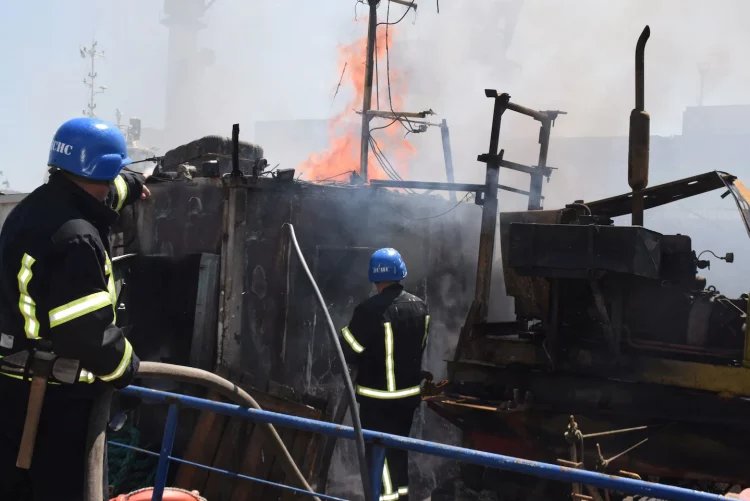Comment on this story
Comment
Russian missiles hit the Black Sea port of Odessa on Saturday, Ukrainian officials said, imperiling a deal Moscow and Kyiv reached a day earlier to allow shipment of millions of tons of trapped grain and ease a global food crisis.
The military command in southern Ukraine said two Kalibr cruise missiles hit the port’s infrastructure but not the grain silos in Odessa — one of the country’s largest and most important seaside trading cities.
Air raid warnings rang at about 11 a.m. with the sounds of explosions echoing across the city. The military’s southern command reported no casualties. It said air defense systems shot down two other missiles in the attack, which the U.S. ambassador to Ukraine described as “outrageous.”
The strike threatens an agreement that diplomats had hailed less than 24 hours earlier as a breakthrough after months of negotiations. Friday’s deal, brokered by the United Nations and Turkey, would help lift a Black Sea blockade that exacerbated global hunger, especially in Africa and the Middle East.
A keystone of the deal is Russia’s promise not to attack Odessa and two other ports involved in the shipments. The deal includes security assurances for both Ukraine and Russia, which agreed not to “undertake any attacks against merchant vessels and other civilian vessels and port facilities” tied to the initiative.
“This attack casts serious doubt on the credibility of Russia’s commitment to yesterday’s deal and undermines the work of the UN, Turkey and Ukraine to get critical food to world markets,” Secretary of State Antony Blinken said in a statement late Saturday.t
Ukraine’s ambassador to Turkey said the attack showed the deal with Russia wasn’t “even worth the signed paper,” while a Ukrainian Foreign Ministry official called it a “spit in the face” of the U.N. chief and Turkish President Recep Tayyip Erdogan.
“This proves only one thing: No matter what Russia says and promises, it will find ways not to implement it,” said Ukrainian President Volodymyr Zelensky.
Anton Gerashchenko, an adviser to Ukraine’s Interior Ministry, shared an image on Telegram that appeared to show smoke rising from the port. “How will the safety of vessels in the port of Odessa be ensured, if Russia continues shelling?” he wrote.
Turkish Defense Minister Hulusi Akar said Saturday that Ukrainian officials told him that the strikes had not hampered the “capacity and capability of the docks, which is important.”
“The Russians told us they had absolutely nothing to do with this attack and they were examining the issue very closely and in detail,” he said in remarks to reporters in the city of Kayseri. “We are also disturbed by this.”
Natalya Humenyuk, a spokeswoman for Ukraine’s southern military command, said a Russian missile hit a pumping station and a fire broke out in the city, the Ukrainian national broadcaster Suspilne reported. Images provided by the military to Reuters show firefighters battling flames close to a ship in the port.
Before the war, now nearing its sixth month, Ukraine was among the world’s major exporters of grain. But with more than 20 million tons stuck in Black Sea ports, the conflict has sparked food shortages and price hikes worldwide, and intensified fears of acute hunger in poorer nations.
Saturday’s attack, hours after the grain deal was signed, “implies that there is no guarantee that even the ships carrying the grains will not be attacked,” sparking concern among aid organizations in East Africa, said Shashwat Saraf, the International Rescue Committee’s emergency director for the region.
U.N. officials said the safe passage of grain, and any violations of the agreement, were meant to be resolved by a coordination center in Istanbul run jointly by Turkey, Russia, Ukraine and the United Nations, but it has yet to be set up.
Other elements were expected to take weeks to put in place, they said. The document calls for merchant ships to travel along agreed channels through the Black Sea, and involves inspections in Turkish ports of vessels headed for Ukraine to ensure they are not carrying weapons.
The attack Saturday will “mean that the economic operators will be extra cautious and will wait to see many days of suspended military operations before daring to operate ships in the area,” David Laborde, senior research fellow at the International Food Policy Research Institute, wrote in an email.
That doesn’t mean the deal signed Friday won’t hold, though. “An agreement like this one will take days if not weeks before being implemented, so a chaotic beginning does not mean the end of it,” Laborde said.
Despite Saturday’s missile strike, Ukraine’s infrastructure minister, Alexander Kubrakov, said his country would keep preparing to ship agricultural exports and trying to unblock its sea ports.
The Ukrainian Sea Ports Authority said in a statement Saturday that under plans for ports to resume operations, ships would arrive and depart from the specified ports in a caravan, accompanied by a lead ship. The agency put out a call for applications for vessels to join a caravan.
U.N. chief António Guterres urged Moscow, Kyiv and Ankara to ensure “full implementation” of the commitments they made “on the global stage,” his office said. “These products are desperately needed to address the global food crisis and ease the suffering of millions of people in need around the globe,” he said.
U.S. and European officials have accused Russia of blockading the exports as leverage, as Moscow blamed Western sanctions and played down the food crisis. “The Kremlin continues to weaponize food,” the U.S. ambassador to Ukraine, Bridget A. Brink, said Saturday.
Dalton Bennett in Odessa, Isabelle Khurshudyan in Dnipro and David L. Stern in Kyiv contributed to this report.
Source by www.washingtonpost.com






























